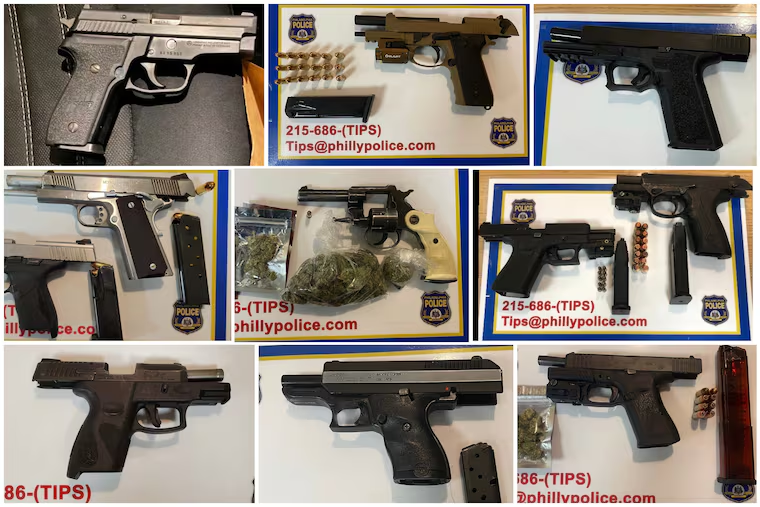Philly program keeps gun offenders out of prison. I’m all for it.
Over the years, I've become more skeptical that incarceration is the answer to all our crime problems.

I love a graduation ceremony, and the one I attended last month was no exception.
But this one was a little different. For starters, it took place inside a courtroom at the Juanita Kidd Stout Center for Criminal Justice in Center City. Also, there was no playing of the quintessential graduation song, “Pomp and Circumstance,” no wearing of caps and gowns. The graduates were dressed in hoodies, jeans, work boots, and other casual attire. There were few family members present, although one graduate carried a small daughter on his hip.
Each had successfully met the requirements for a new diversionary program called the Alternative Felony Disposition program. Created in 2021 by the Philadelphia District Attorney’s Office, with input from the Center for Carceral Communities at the University of Pennsylvania’s School of Social Work, the program allows people with no prior criminal record who have been arrested on illegal gun charges to avoid jail time. The current crop of graduates, who began the program in July, had been assigned social workers they met with regularly. They also had been expected to attend group sessions with other defendants.
Enrollees also were required to attend school or be gainfully employed full time. Counselors worked with them one-on-one, helping them secure better jobs, better housing, or other necessary tools such as their driver’s permits. They also met regularly with the judge on their case via Zoom.
On commencement day, I got misty-eyed thinking about the second chance they had been given. Participants weren’t hard-core criminals; they made a mistake that could have dogged them for the rest of their lives. Yet, here they were, getting an opportunity to start fresh.
I watched as one by one, they rose and took a seat at a table typically reserved for defendants. They listened quietly as Dana Bazelon, who runs the program, talked about what they had accomplished before asking for the judge to agree to clear their record. Then, she handed over what they’d all been waiting for: a piece of paper with a gold seal showing that their gun charges had been dropped and expunged from their record. Some said a few words of thanks. One young man called out, “Y’all are not going to see me again,” as onlookers chuckled.
Steven Goda, 29, a SEPTA supervisor, told me the program had been “a blessing.”
A few months earlier, he’d lost a cousin to street violence and had started carrying a weapon to protect himself. An undercover cop pulled Goda over while driving and saw he had no license. (In Philly, you need a license to carry a gun outside your home.) Goda was happy to be granted this opportunity to clear his name; one of the things he did as part of the program was apply for a passport so he could travel to Punta Cana in the Dominican Republic. “It gave me a second chance,” Goda said of the program.
» READ MORE: Will cracking down on illegal guns reduce crime? | Pro/Con
The program is meant for those who don’t appear to pose a threat, Bazelon told me. “It’s [for] people who have been caught with an illegal gun ... but there’s nothing in the facts of the arrest that suggest that they were going to use the gun,” she explained. “If you brandished the gun or somebody called the police on you for a domestic incident, we don’t take you. If we know you’ve ever had an illegal gun before, we don’t take you.”
Results appear good so far.
Results appear good so far.
The first cohort gathered in 2021. Since then, 186 have graduated — more than half with full-time employment. According to the DA’s office, only 5% of participants wind up arrested again, vs. 21% of people arrested for gun possession who don’t participate in the program.
Philadelphia District Attorney Larry Krasner is wrongly blamed for the proliferation of guns on city streets, with critics claiming offenders aren’t being prosecuted vigorously enough. An Inquirer analysis in March 2021 found that the pace of gun arrests would lead to 3,000 by the end of that year, three times what they were in 2017. And yet, the chances that someone arrested for illegal gun possession will be convicted in court have fallen by nearly a quarter. I’m sure Krasner’s critics would not have gotten misty-eyed watching the recent ceremony as I did. Lock-them-up types usually want even first-time offenders taught a harsh lesson.
Not all that long ago, I might have agreed. But I know better now.
Philly’s gun problem long predates Krasner’s tenure, and the spike in crime we experienced during COVID-19 also happened in other cities around the country. Krasner can’t be blamed for that.
I also better understand that crime is a complex problem — one that Philly can’t expect to arrest its way out of. I agree with officials who say the city’s focus should be on the long-standing structural and systemic issues that drive people to arm themselves illegally, such as underfunded schools, government neglect of impoverished and broken neighborhoods, and a bloated justice system that targets poor and Black and brown city residents.
This program is a step toward redirecting people instead of merely locking them up.
Judging from all the smiles that day, many participants are indeed better off. As I turned to leave, I spotted Goda sitting on a bench outside a courtroom and waved. “Have fun in Punta Cana,” I called out. He beamed and said, “I will.”